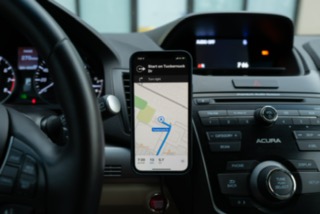Whether we are traveling to a new country or just going to a theme park with friends and family, one thing that we often rely on throughout our journey is GPS. Global Positioning System, popularly known as GPS, provides geolocation and time information across the globe, making it integral to our daily lives and a variety of industries.
Since its introduction in 1973 with a single satellite, GPS now has a constellation of over 75 satellites, providing complete global coverage. It supports various industries, from shipping routes and aircraft navigation with location data to the stock exchange with time information from satellites.
That being said, with so many corporations and industries reliant on GPS systems, are we opening ourselves up to risk if anything happens to the system? In this article, we will understand the risks involved with GPS usage and if the world has become over-reliant on the system.
The Risk Involved with GPS Over-Reliance
There is a growing threat to online privacy posed by GPS. While GPS may be robust enough to hold off against major cyberattacks, it is relatively easy for hackers, terrorists, and other cybercriminals to spoof and trick GPS signals in the blink of an eye. An average criminal with a bit of technical experience can easily make a local GPS go dark for long enough to cause significant consequences.
What exactly are these consequences? Well, imagine you are a shipping company that has just lost its GPS signal and navigational contact with its entire fleet of ships. What do you do now? While there may be some primitive methods of communication and guidance, you are sure to lose an immense amount of money, and things will only get back on track when the GPS is online again.
Ease of Jamming Device Availability
As you can see, there is an immense reliance on GPS systems worldwide, leading to a substantial risk for everyone. What’s even more frightening is that as technology is advancing, GPS spoofing and hacking is becoming even easier.
For example, back in 2018, a supposed hacking of regional GPS data and jamming of drone signals led to more than HK$1 million in damages to the Hong Kong Show. This was due to the jamming causing more than 40 high-tech drones to fall out of the sky, which clearly shows that they had a fatal flaw in their safety and security which can be directly linked to their GPS reliance.
That being said, who exactly is at risk from this level of reliance, and how prominent are the risks involved? Let’s find out.

Who Is At Risk?
Vehicle Owners/Companies
One of the most common avenues for GPS spoofing risk is for vehicle owners and companies. That’s because many people rely on their GPS every day to get to specific locations and couldn’t travel without it. Additionally, many integrated features and apps such as ‘iTrack’ are linked to GPS, leaving your car more vulnerable than you think.
Despite having a failsafe, a hacker can enter the vehicle’s system and possibly even control some components, such as the ignition and display. It’s becoming even more challenging as vehicles are switching to connected electronic systems, allowing more items to be remotely controlled and increasing the risk for vehicle owners immensely.
Energy Industries
While it may not be the first industry that comes to mind, many energy and natural resource plants are dependent on the time information that GPS provides. This data is pivotal for keeping various power systems and grids online, which is crucial to ensuring a seamless electricity flow. Thus, while it may not be immense, the time data loss alone can be an issue on a global scale.
Another issue that is much more dangerous and possibly more difficult to fix would be the issues faced by oil rigs in the ocean. Such floating rigs rely on GPS data for their location, a dynamic value that needs to be continuously updated for integrated systems to function efficiently. Without this, tracking and maintaining such rigs with the same efficiency can be highly problematic.
Airlines
Throughout the aviation industry, GPS is compulsory for aircraft to increase accuracy and safety and provide the real-time and 3D location of active flights. Thus, GPS systems are integrated highly into airplane navigation systems and make up a preeminent portion of their control and piloting capability. Now, what happens if this GPS system were to be jammed?
While there are alternative methods to fly and navigate an aircraft, most modern pilots are inadequately trained, increasing the risks involved. This risk is even more real because jamming military aircraft is a common act of warfare, which can be fatal due to planes’ high altitude and speed.
How to Reduce GPS Reliance
With the various risks involved, GPS reliance is both a boon and a bane for our society. So, with the focus on reducing this overreliance, many organizations and government bodies are working towards creating and integrating alternate systems that can co-exist with GPS. For example, many existing corporations in the world use systems such as the PNT Integrity Library, which continuously verifies GPS receiver signals to reduce the chances of spoofing.
Apart from this, for end-users such as the common vehicle owner or business, there is similar software such as Epsilon Algorithm Suite, which allows spoofing detection and can make their GPS much more reliable. Thus, while GPS is an indispensable part of our world, we can easily reduce our reliance on it to make the world safer!
If you are looking to make your GPS reliance less risky and make sure you don’t fall prey to spoofing attacks or GPS jammers, contact us at Sales@datasafellc.com today!

